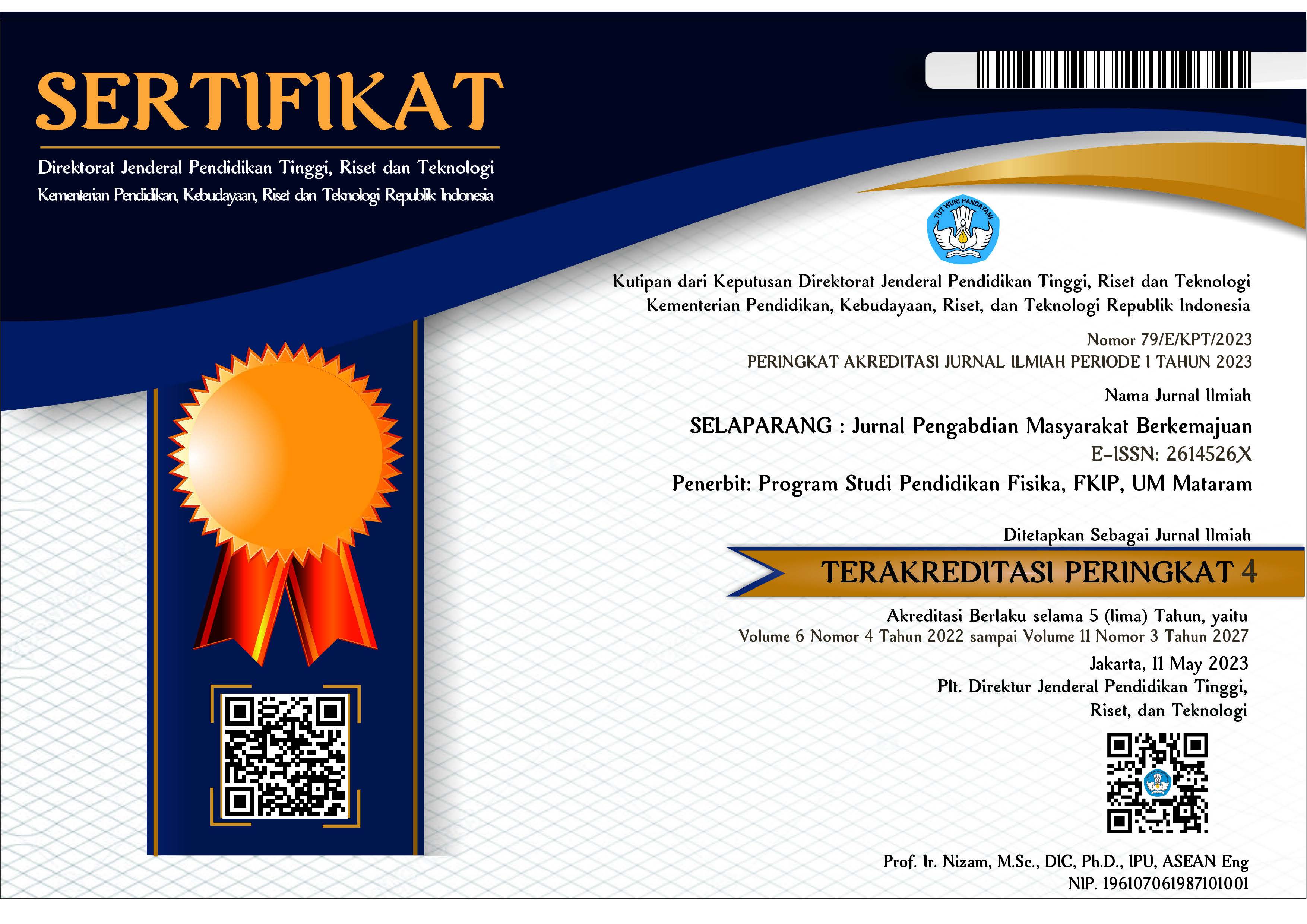EDUKASI POLA HIDUP SEHAT PADA PASIEN DIABETES DIMASA PANDEMIC COVID-19
Abstract
ABSTRAK
Penderita Diabetes Mellitus (DM) memiliki risiko tinggi terpapar Covid-19 karena sistem imun yang menurun, terutama yang memiliki self-management diabetes tidak baik. Dampak Covid juga memperburuk sosial ekonomi sehingga memicu peningkatan stress yang akan memperburuk kadar indeks glikemik dan mengakibatkan seseorang rentan terpapar Covid-19. Kegiatan pengabdian kepada masyarakat ini bertujuan untuk meningkatkan motivasi pasien dengan penyakit kronis khususnya penyakit DM agar dapat menerapkan perilaku sehat dan dapat melakukan manajemen stres dengan cara sederhana dan dapat dilakukan secara mandiri dirumah. Kegiatan ini diikuti oleh 25 pasien diabetes yang tergabung dalam PROLANIS (Program Pengelolaan Penyakit Kronis) di Poliklinik Penyakit Tidak Menular Puskesmas Kecamatan Johar Baru, Jakarta Pusat. Terdapat 4 tahapan yang dilakukan dalam kegiatan ini, yaitu perkenalan dan ice breaking; dilanjutkan dengan penjelasan tentang materi perilaku hidup sehat pasien DM dimasa pandemic dan manajemen stress; demonstrasi dan redemonstrasi cara cuci tangan dan penggunaan masker yang tepat; diakhiri dengan sesi evaluasi. Kegiatan ini dilakukan secara online menggunakan aplikasi daring. Hasil evaluasi terhadap kegiatan ini memperlihatkan bahwa mayoritas peserta memiliki tingkat stress berat sebesar 76% dan manejemen diri DM yang buruk sebesar 60%; selain itu 100% peserta dapat melakukan demonstrasi pemasangan masker, melepaskan masker dan mencuci tangan dengan tepat. Diharapkan tenaga kesehatan dapat memberikan edukasi kesehatan secara berkala terutama bagi masyarakat yang memiliki komorbid Covid-19 agar dapat melakukan perilaku hidup sehat dan dapat meningkatan manajemen diri dengan baik sehingga dapat mencegah paparan penyakit Covid.19.
Kata kunci: covid-19; DM; manajemen stress; perilaku hidup sehat
ABSTRACT
Patients with Diabetes Mellitus (DM) have an increased risk of Covid-19 infection due to immune dysfunction, and poor self-management of diabetes particularly. The Covid-19 has an impact on the social economic aspect that has triggered the increase of stress level thus leading to glycaemic index becoming worse and providing the opportunity for Covid-19 infection. The activity of community service aimed to motivate patients with chronic illness especially DM patients to practice healthy behaviour and stress management which can be implemented at home independently. This activity was attended by 25 DM patients who are members of PROLANIS (Chronic disease management program) at the Non-Communicable Disease outpatient unit in Johar Baru Health Center, Central Jakarta. There were four sessions carried out in this activity, namely introductions and ice breaking; Health education on Healthy behaviour for DM patient in pandemic era and stress management; demonstration and re-demonstration about hand wash and wearing mask appropriately; and the last session is evaluation. This activity was conducted by online used online application software. The result of this activity showed the majority of participants’ experienced severe stress (76%) and poor self-management diabetes mellitus (60%), moreover all of the participants (100%) were able to wear masks, take off the mask, and wash hands appropriately. It is suggested that health care providers are expected to provide health education regularly to communities especially who have comorbid on Covid-19 in order to implement the healthy behaviour and to increase self-management thus preventing risk of Covid-19 infection.
Key words: covid-19; DM; stress management; healthy behaviour
Keywords
Full Text:
PDFReferences
American Diabetes Association. (2020). How Covid-19 impacts people with diabetes. Retrieved from https://www.diabetes.org/coronavirus-covid-19/how-coronavirus-impacts-people-with-diabetes
Anerjee, M., Chakraborty, S., & Pal, R. (2020). Diabetes self-management amid COVID-19 pandemic. Diabetes and Metabolic Syndrome: Clinical Research and Reviews, 14(4), 351–354. Retrieved from https://doi.org/10.1016/j.dsx.2020.04.013
Anita, A. T. (2018). Hubungan Tingkat Stress dengan kadar Gula darah pada Pasien Diabetes Mellitus di RSUD Kota Madiun. Journal of Chemical Information and Modeling, 53(9), 1–113.
Centers for disease control and Prevention. (2020). People of any age with underlying medical conditions. Retrieved from https://www.cdc.gov/coronavirus/2019-ncov/need-extra-precautions/people-with-medical-conditions.html
Harista, R. A., & Lisiswanti, R. (2015). Depresi pada Penderita Diabetes Mellitus Tipe 2. Majority, 4(9), 73–77.
Husmarini, N., Istiono, W., & Wirasto, R. T. (2019). Stress Level Relationship with Prediabetes Events in Sleman Yogyakarta. Review of Primary Care Practice and Education (Kajian Praktik Dan Pendidikan Layanan Primer), 2(2), 76. https://doi.org/10.22146/rpcpe.33981
International Diabetes Federation. (2021). COVID-19 and diabetes. Retrieved from https://www.idf.org/aboutdiabetes/what-is-diabetes/covid-19-and-diabetes/1-covid-19-and-diabetes.html
Li, B., Yang, J., Zhao, F., Zhi, L., Wang, X., Liu, L., … Zhao, Y. (2020). Prevalence and impact of cardiovascular metabolic diseases on COVID-19 in China. Clinical Research in Cardiology, 109(5), 531–538. https://doi.org/10.1007/s00392-020-01626-9
Pal, R., & Bhadada, S. K. (2020). COVID-19 and diabetes mellitus: An unholy interaction of two pandemics. Diabetes & Metabolic Syndrome, 14(4), 513–517. https://doi.org/10.1016/j.dsx.2020.04.049
Peraturan Menteri Kesehatan. Pedoman PSBB dalam rangka Percepatan Penanganan Covid-19 (2020). Indonesia.
Prabawati, D., & Natalia, L. (2020). The Effectiveness of Self-Care Model on Diabetes Self-Management Behaviour. Indonesian Nursing Journal of Education and Clinic (Injec), 5(1), 1. https://doi.org/10.24990/injec.v5i1.277
Prabawati, D., & Setiyowati, Y. (2022). The Risk Factors for Exposure to Covid-19 in Diabetes Patients in the Johar Baru Health Centre Work Area . Jurnal Keperawatan Komprehensif (Comprehensive Nursing Journal), 8(1 SE-Articles). https://doi.org/10.33755/jkk.v8i1.309
Ramanathan, K., Antognini, D., Combes, A., Paden, M., Zakhary, B., Ogino, M., … Brodie, D. (2020). COVID-19 in people with diabetes: understanding the reasons for worse outcomes, (January), 19–21.
RI, P. K. (2018). Lindungi Keluarga Dari Diabetes.
Roncon, L., Zuin, M., Rigatelli, G., & Zuliani, G. (2020). Diabetic patients with COVID-19 infection are at higher risk of ICU admission and poor short-term outcome. Journal of Clinical Virology, 127, 104354. https://doi.org/10.1016/j.jcv.2020.104354
Salari, N., Hosseinian-Far, A., Jalali, R., Vaisi-Raygani, A., Rasoulpoor, S., Mohammadi, M., … Khaledi-Paveh, B. (2020). Prevalence of stress, anxiety, depression among the general population during the COVID-19 pandemic: a systematic review and meta-analysis. Globalization and Health, 16(1), 1–11.
Sharon L. Lewis, Linda Bucher, Margaret M. Heitkemper, Mariann M. Harding, Jeffrey Kwong, D. R. (2017). Medical-Surgical Nursing: Assessment and Management of Clinical Problems.
Shrivastava, S. R. B. L., Shrivastava, P. S., & Ramasamy, J. (2013). Role of self-care in management of diabetes mellitus. Journal of Diabetes and Metabolic Disorders, 12(1), 1. https://doi.org/10.1186/2251-6581-12-14
Wang, A., Zhao, W., Xu, Z., & Gu, J. (2020). Timely blood glucose management for the outbreak of 2019 novel coronavirus disease (COVID-19) is urgently needed. Diabetes Research and Clinical Practice, 162, 108118. https://doi.org/10.1016/j.diabres.2020.108118
WHO. (2020). Media Statement: Knowing the risks for COVID-19. Retrieved from https://www.who.int/indonesia/news/detail/08-03-2020-knowing-the-risk-for-covid-19
DOI: https://doi.org/10.31764/jpmb.v6i2.8036
Refbacks
- There are currently no refbacks.

This work is licensed under a Creative Commons Attribution-ShareAlike 4.0 International License.
______________________________________________________
Jurnal Selaparang
p-ISSN 2614-5251 || e-ISSN 2614-526X
EDITORIAL OFFICE:



















